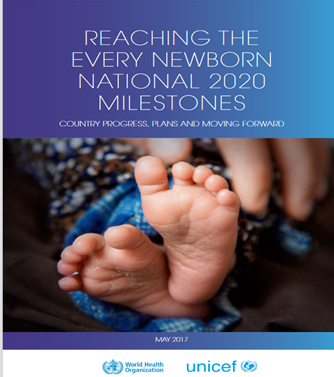|
 Reaching the every newborn national 2020 milestones: country progress, plans and moving forward Reaching the every newborn national 2020 milestones: country progress, plans and moving forward
In 2014, at the Sixty-seventh World Health Assembly, 194 Member States endorsed the Every Newborn: an action plan to end preventable deaths, a road map of strategic actions to end preventable newborn mortality and stillbirths and contribute to reducing maternal mortality and morbidity.
The Every Newborn Action Plan presents evidence-based solutions and sets out a clear path to 2020 with 8 specific milestones for what needs to be done differently to greatly reduce mortality rates and improve maternal and newborn health by 2030. Member States requested that WHO’s Director General monitors progress towards the achievement of the global goal and targets and reports periodically to the Health Assembly until 2030.
For the 2017 World Health Assembly, reporting on the Every Newborn Resolution is part of the progress reporting on the Global Strategy for Women’s Children’s and Adolescent Health. Achieving the goals and targets set out in the Sustainable Development Goals (2016-2030) and the Global Strategy for Women’s, Children’s and Adolescents’ Health (2016-2030) is underpinned by achieving the Every Newborn National and Global Milestones by 2020.
To complement the Global Strategy progress reporting, Reaching the every newborn national 2020 milestones report provides a detailed look at country leadership and action toward the Every Newborn National Milestones by 2020. Countries have taken the initiative to show the way forward and have demonstrated significant progress. As part of monitoring this progress, countries have adopted the Every Newborn Tracking Tool. This report presents a compilation of the data collated by the Every Newborn Tracking Tool in 2016, when 51 countries adopted the tool; it also spotlights examples of specific country activity for each National Milestone.
Finally, Global Milestones for 2020 were part of the Every Newborn Action Plan to guide global and regional work in support of country efforts and this report highlights relevant progress towards those Global Milestones.
Related links
Reaching the every newborn national 2020 milestones: country progress, plans and moving forward
Every newborn action plan |